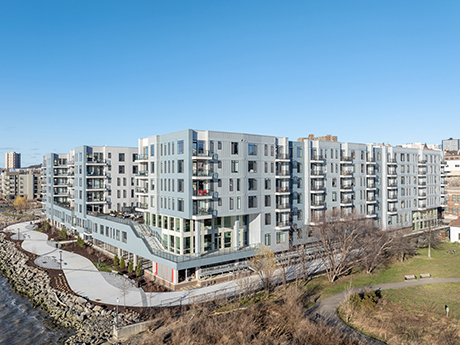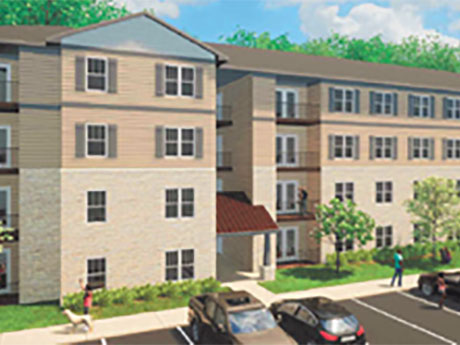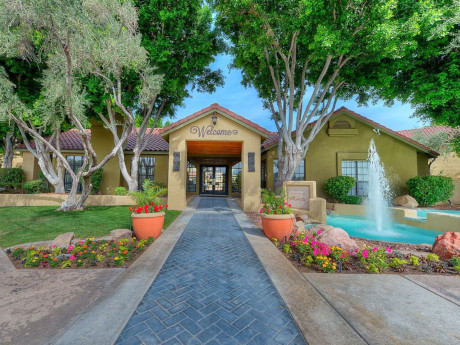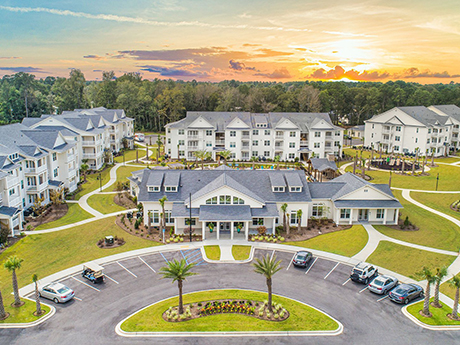BUCKS COUNTY, PA. — Walker & Dunlop has arranged the sale of a 146-unit seniors housing property in Bucks County. The unnamed property, which was developed in 2022 and is located about 30 miles north of Philadelphia, offers independent living, assisted living and memory care services. The buyer was a public healthcare REIT. The seller and sales price were not disclosed. Joshua Jandris, Mark Myers and Brett Gardner led the Walker & Dunlop team on the transaction.
Walker & Dunlop
YONKERS, N.Y. — Affinius Capital has provided a $112.7 million loan for the refinancing of Alexander Crossing, a 440-unit apartment building located north of New York City in Yonkers. The newly built waterfront property offers 119 studios, 218 one-bedroom units, 90 two-bedroom residences and 13 three-bedroom apartments. Units are furnished with stainless steel appliances, quartz countertops and individual washers and dryers. Amenities include an outdoor heated pool, terraces with grills and outdoor games, a fitness center, resident lounge, coworking space, multi-sport simulator and a game room. Jonathan Schwartz, Aaron Appel, Sean Reimer, Keith Kurland, Adam Schwartz and Sean Bastian of Walker & Dunlop arranged the financing on behalf of the borrower, a joint venture between Rose Associates and Battery Global Advisors.
Walker & Dunlop Arranges $148M Refinancing for The Victoria Mixed-Use Tower in Harlem
by Katie Sloan
NEW YORK CITY — Walker & Dunlop (NYSE: WD) has arranged the $148 million refinancing for The Victoria, a mixed-use property in the Harlem neighborhood of Upper Manhattan. At 30 stories, the property is the tallest building in Harlem. The Victoria is built around the neighborhood’s historic Victoria Theater and offers 191 luxury apartments, a 211-room Marriott-branded hotel and 23,000 square feet of retail space. The project was completed in the third quarter of 2023 and also features 52 below-grade parking spaces. Aaron Appel, Keith Kurland, Jonathan Schwartz, Adam Schwartz, Ari Hirt and William Herring of Walker & Dunlop’s New York capital markets team acted as exclusive advisors to the borrowers, Lam Group and Exact Capital. Aareal Capital provided the financing, which will support ongoing operations and future enhancements to the project. “This transaction underscores the project’s significance as a transformative development in Upper Manhattan, combining luxury living, hospitality excellence and cultural preservation,” says Appel. Bethesda, Md.-based Walker & Dunlop is one of the largest commercial real estate finance and advisory firms in the United States. — Katie Sloan
NEW YORK CITY — Invictus Real Estate Partners has provided a $69 million bridge loan for Mason Gray, a 158-unit apartment complex in Brooklyn’s Crown Heights neighborhood. The seven-story building houses 110 market-rate units, most of which are one-bedroom residences, and 48 affordable housing units as well as a 9,000-square-foot community facility space. Mike Diaz and Aaron Appel of Walker & Dunlop arranged the loan on behalf of the borrower, Hope Street Capital, which will use the proceeds to complete construction and fund leasing costs.
LENEXA, KAN. — Walker & Dunlop Inc. has arranged $29.6 million in federal Low-Income Housing Tax Credit (LIHTC) equity for the financing of Canyon Creek East, an affordable housing project in Lenexa. The development will include 212 units across five buildings. Jennifer Erixon led the Walker & Dunlop team that arranged the LIHTC equity, which will finance approximately 40 percent of the total development costs, on behalf of MRE Capital. Canyon Creek East is part of the larger Cedar Canyon West development plan, which encompasses a mix of residential, commercial and recreational facilities. MRE’s development will provide units for households earning between 30 and 80 percent of the area median income.
Walker & Dunlop Negotiates Sale of 125-unit Lakeview Senior Living in Lakewood, Colorado
by Amy Works
LAKEWOOD, COLO. — Walker & Dunlop has negotiated the sale of Lakeview Senior Living, a 125-unit independent living community in the Denver suburb of Lakewood. Livingston Street Capital acquired the community, which was built in 2008. The seller and price were not disclosed. Joshua Jandris led the Walker & Dunlop team.
NEW YORK CITY — Walker & Dunlop has arranged a $110 million construction loan for a 246-unit multifamily project that will be located at 880 Atlantic Ave. in the Prospect Heights area of Brooklyn. The building will house studio, one- and two-bedroom units as well as 13,000 square feet of commercial space. Aaron Appel, Keith Kurland, Jonathan Schwartz, Adam Schwartz, Jordan Casella and William Herring of Walker & Dunlop arranged the loan on behalf of the developer, EMP Capital Group. QuadReal Property Group provided the financing.
River City Bank Provides $15M Loan for Refinancing of Villa Montaña Apartments in Scottsdale
by Amy Works
SCOTTSDALE, ARIZ. — River City Bank has provided a $15 million loan for the refinancing of Villa Montaña, a 208-unit apartment complex located at 11350 E. Sahuaro Drive in Scottsdale. Built in 1986, the property offers one- and two-bedroom units and amenities such as a pool, fitness center and a 24-hour laundry room. Mark Plenge and Grant Robertson of Walker & Dunlop arranged the fixed-rate loan on behalf of the borrower, The Al Angelo Co.
POUGHKEEPSIE, N.Y. — New Jersey-based investment firm Reynolds Asset Management has received a $19.5 million Fannie Mae loan for the refinancing of Violet Estates, an 84-unit multifamily property located north of New York City in Poughkeepsie. Violet Estates is reserved for renters age 55 and above and offers studio, one- and two-bedroom units. Amenities include a resident lounge, fitness center, bocce ball courts and a dog park. The property also houses 7,000 square feet of retail space that is leased to users in the food-and-beverage, fitness and art businesses, among others. Allan Edelson of Walker & Dunlop originated the financing.
Walker & Dunlop Arranges $62M Construction Financing for Multifamily Development in Columbia, South Carolina
by John Nelson
COLUMBIA, S.C. — Walker & Dunlop has arranged $62 million in debt and equity financing for the construction of Burnside Farms Apartments, a new 308-unit multifamily development in Columbia. The borrowers, South Coast Property Investments and Abacus Capital, plan to break ground in June. Jamie Butler, Cliff Ayers, Michael Bowles and Jason McFadden of Walker & Dunlop arranged the non-recourse financing on behalf of the borrowers. The apartment community will feature a mix of market-rate and affordable housing units. The property will be situated at the intersection of Cliff Kinder and Pineview roads within the larger Burnside Farms master-planned community.







